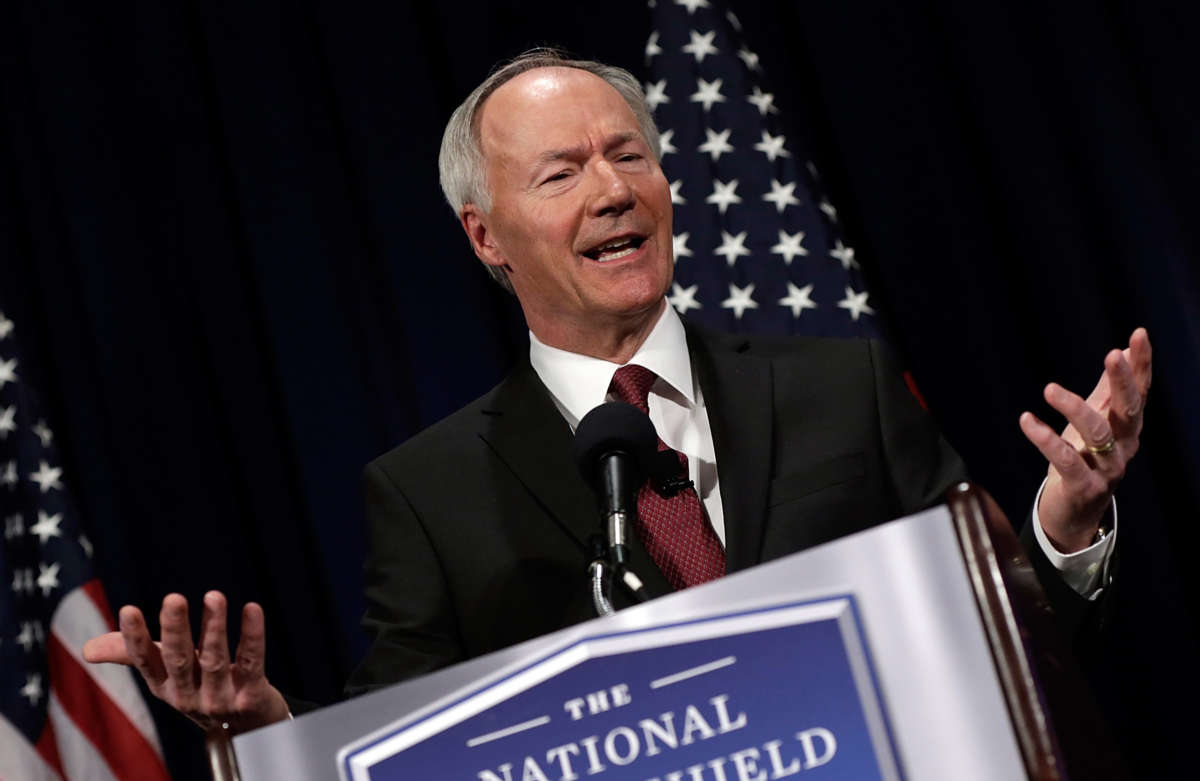Honest, paywall-free news is rare. Please support our boldly independent journalism with a donation of any size.
Arkansas Gov. Asa Hutchinson on Monday vetoed a state bill that sought to ban transgender youth from accessing vital health care. The bill passed the legislature last week.
HB 1570 would have barred doctors from providing puberty blockers and hormones to trans children under 18, denying their right to gender self-determination and setting the stage for mental health crises. The bill baldly disregarded a growing body of medical research that finds the sort of health care that the bill sought to ban to be crucial. Groups like the American Civil Liberties Union (ACLU) had denounced the legislation as “extreme” in its anti-trans nature and called on Hutchinson, a Republican, to kill the bill.
Despite Hutchinson’s veto, the bill isn’t dead yet. It takes only a simple majority vote in both chambers of the legislature to overturn the governor’s veto in the state, and both the Arkansas Senate and House passed the bill decisively.
When he announced his veto, Hutchinson said, “I’m hopeful, though, that my action will cause conservative Republican legislators to think through the issue again and hopefully come up with a more restrained approach.”
Transgender rights activists affirmed the importance of the veto, even if it doesn’t succeed in derailing the bill. “Even if this is overridden. This moment is hugely important and a testament to so many people who put their privacy and their safety on the line to organize and defend trans lives,” wrote ACLU lawyer Chase Strangio on Twitter. Strangio went on to warn Arkansas legislators that if they overturn the veto, the ACLU will sue.
When the bill was passed in the legislature, trans rights advocates and medical professionals spoke out against the bill and organized protests to urge Hutchinson to overturn it.
“This victory belongs to the thousands of Arkansans who spoke out against this discriminatory bill, especially the young people, parents, and pediatricians who never stopped fighting this anti-trans attack,” wrote the ACLU of Arkansas.
Others were hopeful that Hutchinson’s veto represents a “turning point” for Republicans, even if the legislature proceeds to overturn the decision.
During his announcement, Hutchinson expressed concern that the bill would interfere with a doctor’s ability to properly care for their patients and that trans children who are already undergoing treatment would end up turning to unregulated informal markets to get the hormones and other health care they needed.
He came to the decision to veto the bill, he said, after listening to trans advocates and medical professionals about what he called the “significant harm” that the bill could do. Hutchinson added that he believes the bill is a “vast government overreach” and “product of the cultural war in America.”
“This is a major turn in Republican politics,” wrote Steven Thrasher, a journalism professor at Northwestern University. “To have a Republican governor not want to stop in process hormone treatments? To acknowledge the harm of street drugs? To not want to interfere w[ith] doctors and patients? A turning point.”
Strangio urged advocates to switch their focus to changing the minds of the members of the state legislature. “Let this BILL DIE, Arkansas. It is cruel,” tweeted Strangio. “You got two anti-trans laws already signed. Let these kids live.”
Hutchinson had signed another anti-trans bill into law just two weeks ago that banned trans women and girls from participating in school sports teams consistent with their gender.
More than 90 anti-trans laws have been introduced in state legislatures this year, according to the Human Rights Campaign, many of them focused on barring trans people from participating in school sports.
The National Collegiate Athletic Association recently condemned these laws after weeks of silence, joining trans advocates and medical professionals who strongly oppose such legislation. Like HB 1570, bans on sports participation for trans people are part of the relentless and multifaceted attack on trans rights that does massive harm to trans people’s mental health.
A terrifying moment. We appeal for your support.
In the last weeks, we have witnessed an authoritarian assault on communities in Minnesota and across the nation.
The need for truthful, grassroots reporting is urgent at this cataclysmic historical moment. Yet, Trump-aligned billionaires and other allies have taken over many legacy media outlets — the culmination of a decades-long campaign to place control of the narrative into the hands of the political right.
We refuse to let Trump’s blatant propaganda machine go unchecked. Untethered to corporate ownership or advertisers, Truthout remains fearless in our reporting and our determination to use journalism as a tool for justice.
But we need your help just to fund our basic expenses. Over 80 percent of Truthout’s funding comes from small individual donations from our community of readers, and over a third of our total budget is supported by recurring monthly donors.
Truthout has launched a fundraiser to add 340 new monthly donors in the next 5 days. Whether you can make a small monthly donation or a larger one-time gift, Truthout only works with your support.
